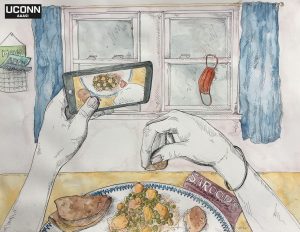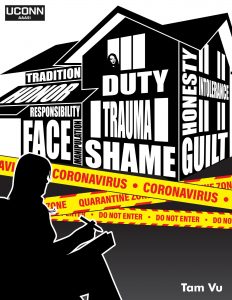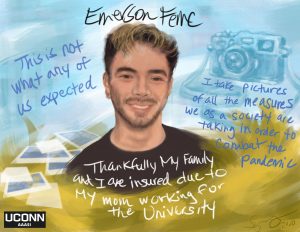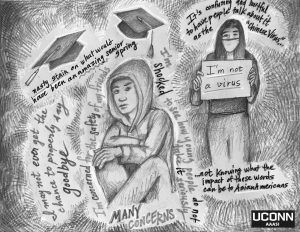Illuminating Resilience
The Asian and Asian American Studies Institute is proud to launch a mental health arts initiative to respond to the challenges and concerns faced by all of our college students during the COVID-19 pandemic. While our students have bravely answered the call to stay at home to prevent the spread of the disease, they are confronted with incredible challenges as they and their families are put under strain. This project brings together personal updates written by students with artists who identify with the stories to acknowledge, share, and reflect upon the experiences. We know our students are strong and resilient, but recognizing their feelings of regret, failure, vulnerability, shame, anxiety, and loneliness is necessary to navigate these new conditions. Art is a gateway to recovery because it shows students that their experiences are worthy of being recognized and they are affirmed by the recognition that such portrayals then evoke.
The connection between trauma and art therapy is well known, but less known are the ways that Asian American studies has had a deep connection with trauma, art, and recuperation. From the artist collectives of the 1960s and 70s to the use of art as an archive standing in for the absence of other recorded evidence, art has given shape to the field of Asian American studies in powerful ways. UConn has been home to top scholars in this field, including Emeritus Professor Margo Machida. Her award-winning and pathbreaking work to illuminate Asian American artists, explore their aesthetic practices, and question how art communicates the history and experience of Asian America is foundational to the field. Also, Board of Trustees Distinguished Professor and Associate Dean for Humanities and Diversity, Equity, and Inclusion (CLAS), Professor Cathy Schlund-Vials has also been a leader in this field through her scholarship on Cambodian refugee memory work found in their artistic expression. There are numerous other examples of the ways that Asian American Studies engaged the arts. A pivotal example is the tremendous work of the Asian American Literary Review, which permeated scholarship, syllabi, professional organizations, and cultural institutions. Another example would be the Smithsonian’s Asian Pacific American Center’s recent online release of the Care Package, which curates a collection of multi-media art to support us all in these difficult times.
Indeed, many have turned to art to respond to the pandemic’s racist politics, cultural isolation, and emotional toll. Notable among them is the #IAmNotAVirus campaign, started by Connecticut resident Mike Keo, along with UConn Asian American studies alum and MSW student Kelly Ha. Artists have always been key to responding to the legacies of racialization, demonization, and scapegoating of diseases as with SARS and AIDS. The social realities of distancing during the pandemic have led to a resurgence of art practice in zines to boost resistance, mutual aid, and self-care. These artistic expressions and journalistic records of individual experiences are valuable history-making in our time as also reflected in the UConn Archives and Special Collections project that documents personal experiences of the pandemic.
The Asian and Asian American Studies Institute humbly draws upon these traditions to openly invite others to contribute their experiences and solicit corresponding art work. Consider contributing to this project to capture student experiences and raise awareness about the personal and societal impacts of the lack of medical preparation, access to testing, imbalanced relief, and deepening inequality.
Tamanna Brar (Senior, Political Science)
 “After I found out that all students have to go back home due to the coronavirus pandemic, I came back on Saturday, March 14th back to my house in Naugatuck. I do feel safe because I am at home with my family. I also have a good amount of resources, I made sure I packed some toilet paper from my apartment, as well as other necessities that are convenient during this time. I also feel blessed that my family can make home-cooked meals. In other words, my family is Punjabi therefore we cook Punjabi food that is enough for all of us at this time. We also have access to affordable health care, and as of now all of us are keeping each other healthy by washing our hands when we come back from outside. The only concerns shaping my experience is the fact that we all have to stay home. It can be quite boring at times because there is only so much you can do, also Governor Lamont recently announced how all salons cannot operate at this time, and since my mother owns a beauty salon that means she has to stop working. However, on a lighter but also unfortunate note, I got surgery within my mouth and I can’t eat some of my favorite foods, which really makes it troublesome because not only am I locked in my house, but I also can’t even eat the food that I want. Overall, it is what it is and I’m only looking at everything positively and keeping myself busy and healthy.
“After I found out that all students have to go back home due to the coronavirus pandemic, I came back on Saturday, March 14th back to my house in Naugatuck. I do feel safe because I am at home with my family. I also have a good amount of resources, I made sure I packed some toilet paper from my apartment, as well as other necessities that are convenient during this time. I also feel blessed that my family can make home-cooked meals. In other words, my family is Punjabi therefore we cook Punjabi food that is enough for all of us at this time. We also have access to affordable health care, and as of now all of us are keeping each other healthy by washing our hands when we come back from outside. The only concerns shaping my experience is the fact that we all have to stay home. It can be quite boring at times because there is only so much you can do, also Governor Lamont recently announced how all salons cannot operate at this time, and since my mother owns a beauty salon that means she has to stop working. However, on a lighter but also unfortunate note, I got surgery within my mouth and I can’t eat some of my favorite foods, which really makes it troublesome because not only am I locked in my house, but I also can’t even eat the food that I want. Overall, it is what it is and I’m only looking at everything positively and keeping myself busy and healthy.
Update: I am feeling much better than before, thank you for your concern. I can now eat the foods I like and everything is in the process of healing. It’s been a whole month since my family and I have been quarantined so we’re just making the best out of the situation. Online classes take up most of my time, but when I am free I like to take some time for myself by either exercising, putting on a face mask, dancing, sketching, doing random photo shoots inside my house or on my porch, and even writing in my journal. I love music, so I’ve been listening to the same songs. i also am writing a small story and have been watching that show Tiger King just to see what all the hype is about. I have a small scar on the side of my face where the surgery was done, and I joke around how by the time my scar goes away quarantine will be over. I hope that would be true, but at the moment all we can do is wait and be positive. I pray for the world every night, hopefully we can be outside soon, especially before my birthday!”
ARTIST: Simi Kang
Simi Kang is a Sikh American educator, scholar, artist, and community advocate. Her work centers Asian American stories and knowledges to interrogate the intersection of environmental injustice and policy. Kang’s scholarship and art have appeared in The Asian American Literary Review, Gravy Quarterly, Hyphen Magazine, Kartika Review, Open Rivers: Rethinking Water, Place & Community, and Jaggery: A DesiLit Arts and Literature Journal. She is currently a Mellon Sawyer Postdoctoral Fellow in the History Department at Carnegie Mellon University.
Tam Vu (Freshman, Exploratory)
 “I am feeling as safe as I can possibly feel during this situation. In the beginning, safety was a huge concern for everyone. But after seeing the efforts the general public and the government put in place to make sure everyone can at least have access to help if they need it, I believe that safety is no longer that large of a concern. I am currently living at home with my parents and brother. Food security was a huge topic for my family, as I would imagine it would be for most of us. At first, we struggled with both what and how much food can be available to us. However, something that really helped were public efforts to provide food for everyone. For my town specifically, there have been centers where free, healthy food is provided to us. This has made a world of a difference for us. In general, my family has 2 family members who are a little vulnerable. Because of this, we have been diligent in making sure things are clean and safe. My mother, specifically, is an RN who works at odd hours with crowds. I am very fortunate to have access to affordable health care and medication. The main things causing stress during this experience would be the emotional/mental toll accommodating to this virus has taken on my family. The stress everyone, especially my parents, are enduring in order to find resources, work, take care of us, and more has really mounted up. And in the beginning, this really affected the family dynamic, resulting in some toxic emotional situations for us. However, I believe that the experiences and difficulties we are going through as a family really highlight issues that have long been a part of this household, and it could be a way to finally resolve them, as they escalate. If I am being completely honest with myself, I admit to falling into despair after coming back, and I think this is an experience a lot of kids in traditional Asian American first generation families are going through. It makes me guilty, but in all honesty, going to college is a huge part of cementing myself and being free. Coming back to the same norms and toxic situations really makes you struggle a lot with this. However, as time has gone by, learning to adapt to this has taught me a lot about growing up. Before, I never realized that emotional support and health is so heavily dependent on having people outside of your family, and I didn’t understand that. But after realizing this, it has made a world of difference for me, and I people with a similar situation can realize this soon as well.”
“I am feeling as safe as I can possibly feel during this situation. In the beginning, safety was a huge concern for everyone. But after seeing the efforts the general public and the government put in place to make sure everyone can at least have access to help if they need it, I believe that safety is no longer that large of a concern. I am currently living at home with my parents and brother. Food security was a huge topic for my family, as I would imagine it would be for most of us. At first, we struggled with both what and how much food can be available to us. However, something that really helped were public efforts to provide food for everyone. For my town specifically, there have been centers where free, healthy food is provided to us. This has made a world of a difference for us. In general, my family has 2 family members who are a little vulnerable. Because of this, we have been diligent in making sure things are clean and safe. My mother, specifically, is an RN who works at odd hours with crowds. I am very fortunate to have access to affordable health care and medication. The main things causing stress during this experience would be the emotional/mental toll accommodating to this virus has taken on my family. The stress everyone, especially my parents, are enduring in order to find resources, work, take care of us, and more has really mounted up. And in the beginning, this really affected the family dynamic, resulting in some toxic emotional situations for us. However, I believe that the experiences and difficulties we are going through as a family really highlight issues that have long been a part of this household, and it could be a way to finally resolve them, as they escalate. If I am being completely honest with myself, I admit to falling into despair after coming back, and I think this is an experience a lot of kids in traditional Asian American first generation families are going through. It makes me guilty, but in all honesty, going to college is a huge part of cementing myself and being free. Coming back to the same norms and toxic situations really makes you struggle a lot with this. However, as time has gone by, learning to adapt to this has taught me a lot about growing up. Before, I never realized that emotional support and health is so heavily dependent on having people outside of your family, and I didn’t understand that. But after realizing this, it has made a world of difference for me, and I people with a similar situation can realize this soon as well.”
ARTIST: Dinh Tran
Dinh Tran is a California-based graphic designer who provides design and consulting solutions to help brands and products grow. Dinh has worked on projects with, but not limited to, Disney Consumer Products, FAO Schwarz, Warner Brothers, and The Sharper image. He is also heavily involved with the Vietnamese American community in Orange County and nationally through the Scouting program.
Ermerson Femc (Junior, History & Human Rights)
 “Yes, I feel very safe. I live in Mansfield actually and am located a mere two and a half miles from the UConn campus in the woods. I’ll be living here, with my mother and father, for the remainder of the year. Yes, the local Price Chopper is open along with other even more local food co-ops. Yes, my father and mother are mid-sixties so I am trying to do all I can to keep myself contained and them safe. Not to mention my grandparents who are also in their nineties and live in Tampa, Florida. Yes, thankfully my family and I are insured due to my mom working for the university. Other concerns I have are for my friends who’s parents own local businesses, mainly food, which are being hit especially hard by this pandemic. I worry as they do not have the same security as my family and I do and am helping them in any way we can.
“Yes, I feel very safe. I live in Mansfield actually and am located a mere two and a half miles from the UConn campus in the woods. I’ll be living here, with my mother and father, for the remainder of the year. Yes, the local Price Chopper is open along with other even more local food co-ops. Yes, my father and mother are mid-sixties so I am trying to do all I can to keep myself contained and them safe. Not to mention my grandparents who are also in their nineties and live in Tampa, Florida. Yes, thankfully my family and I are insured due to my mom working for the university. Other concerns I have are for my friends who’s parents own local businesses, mainly food, which are being hit especially hard by this pandemic. I worry as they do not have the same security as my family and I do and am helping them in any way we can.
Update: Feeling good, still in isolation with my family (its own issue) but we are feeling well and no signs of sickness. Thankfully as I mentioned last time my mom works for the University so I’m sure you’re aware of the benefits and we’re all eternally grateful for these. I’ve been doing some compiling for the final Zine too. Every time I go out in public I take pictures of all the measures we as a society are taking in order to combat the pandemic. It’s quite cool to see how our society has shifted in time of crisis from week one to week four and five. I was even able to convince some workers to allow me to take pictures of them behind the glass dividers used to protect from contaminants. Other than this there’s not much occurring with me. I am working, doing my work as I can but it’s so hard considering the quality has diminished in so many aspects due simply to the fact that learning has gone onto an on line setting. It’s very interesting talking with friends from dorms, classes, etc and how this is not what any of us (from anyone) expected an on line experience to consist of for a $30,000 education; and that’s in-state.”
ARTIST: Szu-Chieh Yun
Szu-Chieh Yun is a Boston-based artist whose practice explores themes of migration, immigration, and transformation with a focus on the Chinese diaspora. She is a first-generation Taiwanese-American. Szu-Chieh’s work derives from her experience in crossing between distinct cultures and places. Her work is a response to the spaces she has traveled to, her surroundings, and in reflection of her identity. Find her website here
Anonymous (Senior, Physiology / Neurobiology & Statistics)
 “For the most part, I do feel safe. I’m currently living at my parents’ house in Branford, CT and will stay there for the foreseeable future. Yes I have the resources for healthy and reliable food, although we are looking at means to potentially have food delivered to us in the event that going to the grocery store is unsafe. Yes, my parents have pre-existing conditions, more of my friends than I thought are immunocompromised, my grandparents living in Michigan cannot leave their apartments. Many concerns, too many to state, but overall the pandemic and the whole experience has drastically altered my life and put a nasty stain on what would have been an amazing senior spring. To branch off on question #5. I’m frightened that this spontaneous end is going to be the lasting memory of my time at UConn. I’m terrified that I may not ever get the chance to properly say goodbye to some of the people I wanted to. I’m concerned for the safety of my friends and peers, and for the whole nation, I’m shocked to see how young people do not take it seriously. I worry about how the economic impact will impact my family’s retirement accounts. It’s confusing and hurtful to me to have people talk about it as “the Chinese Virus”, not knowing what the impact of these words can be to Asian Americans. I cry at the fact that a childhood dream of mine, to walk at my college graduation, may never be realized, and how it took so much time and work to get to this stage for it to all go to waste.”
“For the most part, I do feel safe. I’m currently living at my parents’ house in Branford, CT and will stay there for the foreseeable future. Yes I have the resources for healthy and reliable food, although we are looking at means to potentially have food delivered to us in the event that going to the grocery store is unsafe. Yes, my parents have pre-existing conditions, more of my friends than I thought are immunocompromised, my grandparents living in Michigan cannot leave their apartments. Many concerns, too many to state, but overall the pandemic and the whole experience has drastically altered my life and put a nasty stain on what would have been an amazing senior spring. To branch off on question #5. I’m frightened that this spontaneous end is going to be the lasting memory of my time at UConn. I’m terrified that I may not ever get the chance to properly say goodbye to some of the people I wanted to. I’m concerned for the safety of my friends and peers, and for the whole nation, I’m shocked to see how young people do not take it seriously. I worry about how the economic impact will impact my family’s retirement accounts. It’s confusing and hurtful to me to have people talk about it as “the Chinese Virus”, not knowing what the impact of these words can be to Asian Americans. I cry at the fact that a childhood dream of mine, to walk at my college graduation, may never be realized, and how it took so much time and work to get to this stage for it to all go to waste.”
ARTIST: Quyen Truong
Quyen Truong is a fine artist and graphic designer who has exhibited in New York City, Boston, and across New England. She is particularly interested in the ways in which art can create spaces for meaningful discourse. The paintings she created to elucidate her father’s seven years of imprisonment in Vietnamese Re-Education Camps have been integrated into the Choices Program at Brown University as part of a national curricula to teach students about the unintended consequences of war. Find her website here